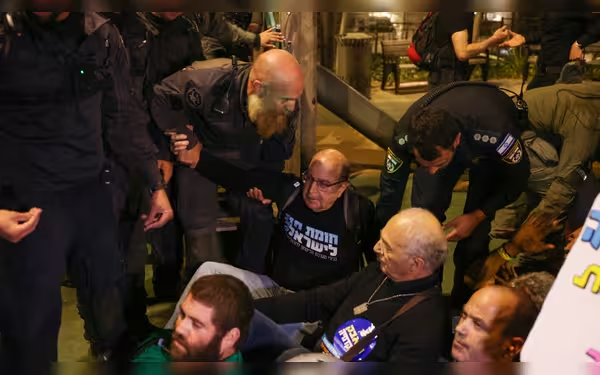Saturday, December 21, 2024 05:20 PM
Yaalon Accuses Israel of Ethnic Cleansing in Gaza
- Yaalon claims Israeli military actions amount to ethnic cleansing.
- Israeli operations in Gaza have resulted in significant civilian casualties.
- UN describes conditions for Palestinians as life-threatening.
 Image Credits: arabnewspk
Image Credits: arabnewspkFormer Israeli minister Yaalon accuses the military of ethnic cleansing in Gaza amid escalating violence and significant civilian casualties.
In recent developments, the ongoing conflict in Gaza has taken a new turn as former Israeli defense minister Moshe Yaalon has made serious allegations against the Israeli army. On Saturday, Yaalon accused the military of engaging in "ethnic cleansing" in the Gaza Strip, a statement that has ignited significant controversy within Israel.
During an interview on the private channel DemocratTV, Yaalon expressed his concerns about the current military actions in Gaza. He stated, "The road we are being led down is conquest, annexation and ethnic cleansing." This strong language reflects the gravity of the situation, as he pointed out the destruction of areas such as Beit Lahia and Beit Hanoun, emphasizing that the land is being cleared of Arabs.
The northern region of Gaza, where these towns are located, has been under intense Israeli military operations since October 6. The aim of these operations is to prevent the Palestinian militant group Hamas from regrouping following their attack on Israel on October 7, which resulted in the deaths of 1,207 individuals, primarily civilians.
Yaalon, who served as the head of the Israeli army from 2002 to 2005 and later as defense minister, has faced backlash for his comments. Far-right National Security Minister Itamar Ben Gvir criticized Yaalon, calling it a "shame" that someone with his background would make such statements. Additionally, Netanyahu's Likud party condemned Yaalon's remarks as "empty and dishonest," suggesting that they serve as a "gift to the ICC and to the camp of Israel’s enemies." This reference to the International Criminal Court highlights the serious legal implications surrounding the ongoing conflict.
The situation in Gaza has escalated dramatically, with reports indicating that Israel's retaliatory actions have resulted in the deaths of approximately 44,382 people, according to figures from the Hamas-run health ministry. The United Nations has also weighed in, with a special committee stating that the conditions imposed on Palestinians are life-threatening and that the actions of Israel could be characterized as genocide.
Israel, however, has dismissed the UN's assessment, labeling it as "anti-Israel fabrications." This ongoing conflict raises critical questions about the humanitarian impact on civilians and the broader implications for peace in the region.
As the situation continues to unfold, it is essential for the international community to closely monitor developments and advocate for a resolution that prioritizes human rights and the protection of civilians. The words of leaders like Yaalon serve as a reminder of the complex and often painful realities faced by those living in conflict zones. Understanding these dynamics is crucial for fostering dialogue and seeking a path toward lasting peace.













